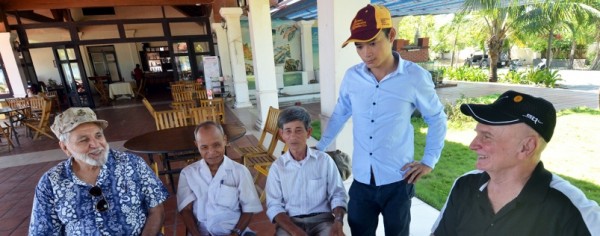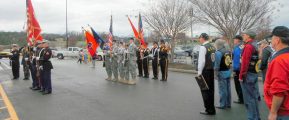A Friendly Chat Between Marines and Viet Cong

By Erik Slavin, Stars and Stripes staff writer
DA NANG, Vietnam — Fifty years ago, two of the men sitting around this table at the Red Beach Resort were enemies of the United States.
They were part of the Viet Cong, the irregular North Vietnam forces that used small-force tactics in the bush against U.S. fighters during the Vietnam War.
Any animosity they felt toward the U.S. — and more specifically, toward the U.S. Marine veterans living in Da Nang who they now call friends — is history, they said.
The Marines at the table in late September completely agree with their former foes.
They’ve gathered together a few times at Red Beach, where the Marines first landed on March 8, 1965, and talked about the old days. Every time, the Marines say, they’ve learned something new.

Marines landing at Da Nang beach in 1965 (U.S. Marine Corps)

From left: Former Viet Cong members Phan Van Tai and Nguyen Tien, and former Marines Larry Vetter and Chas Lehmann walk along Red Beach in Da Nang on Sept. 25, 2015. (Erik Slavin/Stars and Stripes)
The friends agreed to talk to Stars and Stripes. The Marines at the table were Larry Vetter, a former engineer and later a Recon company commander, along with Chas Lehmann and Chuck Palazzo, both of whom were enlisted.
The Viet Cong were Phan Van Tai, a captain, and Nguyen Tien, who worked on propaganda and psychological operations. A translator also attended.
Their conversation has been edited for length and clarity.
Stars and Stripes: What were you doing when the Marines landed?
Tai: We looked like normal people. I was just looking and watching.
Tien: I watched the time they landed, the place, how many fighters and what types of weapons they were using.
Vetter: He and I were in small teams, Recon. Were you out there in the mountains, or mostly around here?
Tien: Most of the time I stayed here, but sometimes I followed a group in the mountains. We would talk to the girls who’d meet the soldiers to get information.
Lehmann: That was common knowledge.
Vetter: One of the things we’d do, we were required to do, was to hire Vietnamese to work in our camps. They’d clean, they did barbershop work, and we all knew there were many VC coming in and out. I always was afraid, I don’t know if they knew any barbers that cut hair. They’d cut your hair, but then they’d pick up a straight razor and do the edge all the way around. I’d [think] “This guy’s a VC, he’s going to bring that around the edge and slit my throat.”
Stars and Stripes: What were your impressions of the Marines?
Tien: The first time when we saw the Marines landing, we thought they were strong and their weapons were very good. … After some months, we thought that we can win, because the Marines, when they prepare for fighting, they prepare for a very long time. We knew where the Marines would fight.
Lehmann: So they looked at the Marines and said, “The Marines moved slow”?
Tien: No, they prepared slow. It looked like they did everything how they learned it in school. But the VC very quickly attacked.
Vetter: He’s saying the Marines brought what they learned in America to Vietnam, and they’re Vietnamese, they know how to work the terrain, they know how to work the people, they know how to move in and out fast.
Tien: Before the Marines finish setting up, we fight.
Lehmann: Their reaction was more without planning.
Vetter: Much more mobile. The people were their friends, for the most part. My analysis of it was that you had about 20 percent of the Vietnamese that were pro-South Vietnamese, pro- French, pro-American. Then you had 20 percent who were very active against us, and the 60 percent in between were passively against us, not wanting us here really.
Right over here at this town … I had people from the higher headquarters tell me I had to get up a joint patrol with a South Vietnamese squad and I said no, and they made me do it. As they were walking into the ambush zone … the South Vietnamese army squad stood up, spoke in Vietnamese and ran. And my Marines are saying, “Holy [expletive], what just happened?” And the Viet Cong, NVA, whoever they were, it was 1969, they opened fire where the South Vietnamese squad had been. I had one Marine killed and a couple wounded. And they of course ran off the VC, but that’s an example, even as late as 1969, you didn’t trust most of the South Vietnamese. These guys [VC] were better.
Lehmann: The VC were more aggressive. The ARVNs were trying to get away from that, even though they had uniforms … I think these guys were better than the ARVNs. [ARVN is an acronym for the Army of the Republic of South Vietnam.]

Nguyen Tien, center, a former Viet Cong soldier, shows U.S. Marine veterans his wooden leg while having coffee at the Red Beach Resort in Da Nang, Vietnam, on Sept. 25, 2015. At left is Phan Van Tai, a former Viet Cong captain. (Erik Slavin/Stars and Stripes)
Tien: I think the South signed up so they could get a salary from the Americans.
Stars and Stripes: When did you begin to see Americans as something other than enemies?
Tai: From when Bill Clinton visited in 1995.
Palazzo: When the trade embargo ended. Yeah, they just celebrated 20 years. [Bill Clinton returned for the anniversary in July.]
Tai: Before Clinton opened trade, it was really difficult. After that, it became better. After Clinton opened trade, a lot of countries showed interest, so the government said that Vietnam wanted to make friends with other countries. So we close the door to the past, and open the door to the future.
Stars and Stripes: Do you think about those days that you were VC a lot, or is it something you try not to think about?
Tien: When I’m alone, I think about my friends, about the people who died. Other Viet Cong, we meet together and we talk about it, about once a month.
Stars and Stripes: Do your friends in the VC feel the same way about Americans as you do, or do they still have some hard feelings?
Tien: They don’t hate Americans. They look at you the same way we do. You are friendly. We want more friends to love Vietnam.
Editor’s Note: The following story is being reprinted with the permission of Stars and Stripes, which retains all rights. The story originally ran Nov. 16, 2015.
PHOTOS: Erik Slavin / Courtesy of Stars and Stripes, All Rights Reserved



